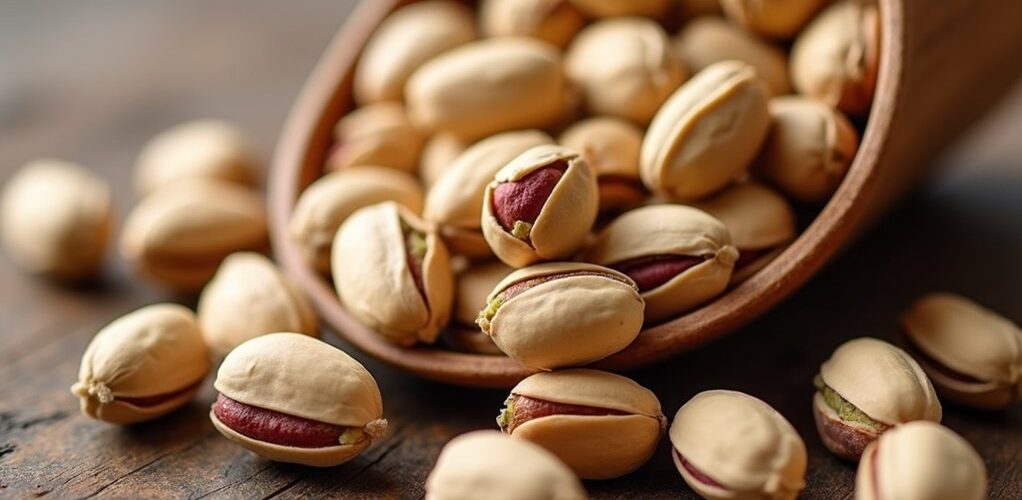
Pistachios contain 5 grams of net carbs per one-ounce serving, making them a moderate-carb option for low-carb diets. While higher in carbs than some nuts like pecans or macadamia nuts, pistachios offer significant nutritional benefits, including protein, healthy fats, and essential minerals. Mindful portion control is key, with a recommended limit of two ounces daily. Their low glycemic index and high fiber content make them a viable choice for those seeking balanced nutrition while managing carbohydrate intake.
Key Takeaways
- Pistachios contain 8 grams of total carbs per ounce, with 3 grams of fiber, resulting in 5 grams of net carbs.
- Compared to other nuts like macadamia (1.5g) and pecans (1.2g), pistachios have moderate net carb content.
- On a keto diet allowing 20-50 grams of net carbs daily, pistachios can fit if portions are carefully controlled.
- Limit pistachio intake to 2 ounces daily to maintain low-carb goals while enjoying their nutritional benefits.
- Pistachios' low glycemic index helps maintain stable blood sugar levels, making them suitable for low-carb diets.
Understanding the Carb Content in Pistachios
For individuals following a low-carb lifestyle, understanding the carbohydrate content in pistachios is vital for making informed dietary choices. These nuts contain 8 grams of total carbohydrates per one-ounce serving, with 3 grams of dietary fiber, resulting in 5 grams of net carbs. This carb content makes pistachios a viable option for those adhering to low-carb or keto eating plans. While monitoring portion sizes remains important, pistachios offer additional nutritional benefits with 159 calories, 6 grams of protein, and 13 grams of fat per serving. Their low glycemic index contributes to blood sugar stability, making them particularly suitable for individuals tracking their carbohydrate intake. Additionally, pistachios are rich in healthy fats, which are essential for maintaining ketosis on a low-carb diet. Understanding these nutritional facts helps guarantee that pistachios can be incorporated effectively into a carb-conscious diet plan.
The Role of Net Carbs in Ketogenic Diets
Understanding net carbs is essential for ketogenic dieters, with pistachios offering a manageable 5 grams of net carbs per ounce when subtracting fiber from total carbohydrates. These calculations help individuals maintain ketosis while incorporating nuts into their daily carbohydrate allowance, typically ranging from 20-50 grams of net carbs per day. Consuming a diet with improved insulin sensitivity is crucial for managing type 2 diabetes effectively.
Calculating Total Carb Content
When following a ketogenic diet, calculating the net carb content of pistachios proves vital for maintaining ketosis. The total carb content of 8 grams per ounce, minus 3 grams of fiber, yields 5 grams of net carbs, making them a viable option for those monitoring their carbohydrate intake.
Understanding the complete nutritional profile helps maintain proper portion control:
- One ounce serving contains 159 calories
- Each serving provides 6 grams of protein and 13 grams of fat
- Net carbs represent 5 grams per serving when fiber is subtracted
These calculations become significant for keto diet adherence, as exceeding the recommended serving size can quickly impact daily carb limits.
Effects On Ketosis Maintenance
Many individuals following a ketogenic diet can successfully maintain ketosis while incorporating pistachios, provided they carefully monitor their net carb intake. With 5 grams of net carbs per ounce, pistachios offer a moderate carbohydrate option that can align with keto requirements when consumed in controlled portions.
The healthy fats present in pistachios contribute to satiety, helping practitioners avoid overconsumption that could potentially disrupt ketosis maintenance. The low glycemic impact of pistachios supports stable blood sugar levels, making them a suitable choice for those committed to maintaining ketosis.
However, success lies in portion control, as exceeding recommended serving sizes can lead to accumulated carbohydrate intake. Regular monitoring of total daily net carbs guarantees pistachios remain a beneficial addition to a ketogenic eating plan.
Daily Net Carb Limits
Daily net carb limits form the foundation of successful ketogenic eating, with most practitioners aiming to consume between 20 to 50 grams per day. Understanding these limits helps individuals make informed decisions about incorporating low-carb nuts like pistachios into their meal plans while maintaining ketosis and supporting weight loss goals.
When following a keto diet, it's crucial to track net carbs accurately by subtracting dietary fiber from total carbohydrates.
Consider these key points for managing daily net carb intake:
- Monitor portion sizes carefully, as even keto-friendly foods can contribute notably to daily limits
- Calculate net carbs for all food choices to guarantee staying within the targeted range
- Plan meals in advance to distribute net carb allowance throughout the day effectively
This systematic approach to tracking net carbs enables sustainable adherence to ketogenic principles while enjoying moderate portions of nutritious foods like pistachios.
Comparing Pistachios to Other Keto-Friendly Nuts
Several popular keto-friendly nuts offer lower net carb counts than pistachios, making them more suitable options for strict ketogenic diets. While pistachios contain 5 grams of net carbs per ounce, alternatives like pecans and macadamia nuts provide considerably lower carb content at 1.2 and 1.5 grams respectively. Understanding these differences helps in managing portion sizes effectively. The Keto diet's unique macronutrient ratios emphasize low carbohydrate intake to maintain ketosis, making it crucial to choose nuts with minimal net carbs to sustain this metabolic state.
| Nut Type | Net Carbs/oz | Keto Suitability |
|---|---|---|
| Pecans | 1.2g | Excellent |
| Macadamia | 1.5g | Excellent |
| Brazil Nuts | 1.4g | Excellent |
| Almonds | 2.0g | Very Good |
| Pistachios | 5.0g | Moderate |
When compared to cashews at 9 grams per ounce, pistachios remain a better choice for keto dieters, though careful monitoring is still essential to maintain ketosis.
Health Benefits Beyond the Carb Count
The extensive range of health benefits offered by pistachios extends far beyond their carbohydrate content, making them a valuable addition to any diet, including low-carb eating plans. Their low glycemic index helps maintain stable blood sugar levels, while their fiber content promotes digestive health and supports weight management goals. These nutrient-dense nuts deliver significant advantages for heart health through their antioxidant properties and impressive potassium content:
- Contains lutein and beta-carotene, which may help reduce bad cholesterol
- Provides three times more potassium than bananas per ounce
- Offers 6 grams of protein per serving, supporting muscle maintenance
Research indicates that incorporating pistachios into a balanced diet can contribute to overall cardiovascular wellness while providing sustained energy throughout the day, making them an excellent choice for health-conscious individuals. Additionally, the improved insulin sensitivity associated with a ketogenic diet can be supported by including pistachios, as they help maintain stable blood glucose levels.
Portion Control Strategies for Pistachio Lovers
Managing portion sizes proves essential for pistachio enthusiasts who want to enjoy these nutritious nuts while maintaining their low-carb lifestyle goals. With 5 grams of net carbs per one-ounce serving, careful attention to consumption amounts helps prevent overconsumption and maintain dietary targets.
Mindful portion control lets you savor pistachios while staying within your low-carb goals, making every serving count toward better health.
Several effective portion control strategies can help pistachio lovers stay on track. Pre-portioning nuts into individual containers or bags eliminates the risk of overeating that comes with consuming directly from larger packages.
Choosing pistachios in shells naturally slows down eating, promoting mindful consumption and enhanced satiety. Additionally, maintaining a food diary provides accountability and helps track daily intake, ensuring that serving sizes align with carbohydrate goals.
These practical approaches allow individuals to enjoy pistachios while adhering to their low-carb dietary requirements.
Impact on Blood Sugar and Ketosis
Understanding pistachios' impact on blood sugar and ketosis proves essential for individuals following a low-carb lifestyle. With only 5 grams of net carbs per ounce, pistachios offer a balanced nutritional profile that supports stable blood sugar levels while maintaining ketosis.
Their combination of fiber, healthy fats, and protein creates a powerful trifecta for metabolic health.
Key benefits of pistachios for blood sugar management include:
- Low glycemic index prevents sudden glucose spikes
- 3 grams of fiber per serving slows sugar absorption
- Healthy fats and protein support sustained ketosis
The nuts' natural composition makes them an excellent choice for those monitoring their carbohydrate intake. Regular consumption of moderate portions can help individuals maintain their low-carb goals while enjoying a satisfying and nutritious snack option. Additionally, pistachios may contribute to improved insulin sensitivity, a benefit noted in ketogenic diet research for diabetes management.
Creative Ways to Fit Pistachios Into Your Low-Carb Menu
Integrating pistachios into a low-carb diet opens up numerous creative culinary possibilities while maintaining nutritional goals. These versatile nuts, which are naturally low in carbs and rich in healthy fats, can enhance various keto meal options through thoughtful preparation methods. Home chefs can incorporate pistachios as a crunchy salad topping, providing texture and nutritional benefits to everyday greens. For those seeking creative ways to maintain their low-carb lifestyle, crushed pistachios serve as an excellent breadcrumb substitute when coating meats or vegetables. Additionally, adding these nuts to smoothies creates a creamy texture while boosting nutrient content. Whether enjoyed as a standalone snack, limited to about 49 nuts per serving, or mixed into protein-rich dairy options like yogurt and cottage cheese, pistachios offer both versatility and satisfaction in low-carb meal planning. Nuts and seeds are nutrient-dense, providing healthy fats, protein, and fiber, which makes pistachios a great addition to a keto diet.
Managing Weight Loss Goals With Pistachios
Success with pistachios in a weight loss journey hinges on mindful portion control, with experts recommending pre-measuring one-ounce servings into small containers for grab-and-go convenience. The combination of protein, fiber, and healthy fats in pistachios creates a satisfying snack that can effectively support weight management goals when consumed in appropriate amounts. Strategic placement of pre-portioned pistachio servings in visible locations, paired with tracking daily intake, helps maintain accountability while incorporating these nutrient-dense nuts into a structured weight loss plan. Additionally, incorporating pistachios into a keto diet can enhance metabolic health and aid in better appetite regulation, making them a smart choice for those pursuing weight loss.
Portion Control Tips
When incorporating pistachios into a low-carb diet, proper portion control becomes essential for maintaining weight loss goals while enjoying their nutritional benefits.
With 5g of net carbs per one-ounce serving, monitoring your intake helps maintain a balanced approach to weight management.
To effectively control portions and monitor your caloric needs, consider these practical strategies:
- Pre-portion pistachios into individual serving containers, ensuring you consume one serving at a time.
- Practice mindful eating by manually shelling pistachios, which naturally slows consumption and promotes satiety.
- Track daily consumption using a food diary or app, limiting intake to no more than 2 ounces per day.
These portion control tips help prevent overconsumption while allowing you to enjoy pistachios as part of a healthy, low-carb lifestyle.
Weight Loss Success Strategies
Achieving weight loss goals becomes more manageable with the strategic inclusion of pistachios in a low-carb eating plan. With only 5 grams of net carbs per ounce, these nuts fit seamlessly into a keto lifestyle while providing substantial nutritional benefits.
The combination of protein and fiber in pistachios creates a powerful satiety effect, helping individuals maintain their weight loss objectives through better appetite control. Each serving delivers 6 grams of protein and 3 grams of fiber, making it an effective tool for managing hunger between meals.
Additionally, the practice of manually shelling pistachios promotes mindful eating, which naturally slows consumption and enhances portion control. At 159 calories per ounce, pistachios offer a satisfying and nutrient-dense option that supports sustained weight management while adhering to low-carb dietary guidelines.
Essential Nutrients and Mineral Content
Packed with an impressive array of essential micronutrients, pistachios stand out as a nutritional powerhouse in the world of nuts and seeds. Their mineral content includes significant amounts of potassium, magnesium, and phosphorus, with potassium levels three times higher than bananas per ounce. The combination of essential nutrients found in pistachios supports various bodily functions and overall wellness.
These nuts deliver substantial nutritional benefits through their:
- High vitamin B6 content for improved metabolism and immune function
- Rich fiber content at 3 grams per ounce for digestive health
- Concentrated mineral profile featuring potassium, magnesium, and phosphorus
Each one-ounce serving provides 6 grams of protein alongside beneficial unsaturated fats, making pistachios an excellent choice for those seeking nutrient-dense food options.
Storage Tips for Maximum Freshness
Proper storage techniques play an important role in preserving the quality and nutritional value of pistachios. To maintain ideal freshness, store these nuts in an airtight container away from direct sunlight and moisture. The perfect storage temperature should remain below 70°F (21°C) in a cool, dry place.
For extended storage periods, consider refrigerating or freezing pistachios, which can preserve their freshness for up to one year without compromising flavor.
When purchasing pistachios in non-resealable packaging, transfer them to a secure container immediately after opening. Regular inspection of stored pistachios is necessary to prevent spoilage; check for signs of rancidity, including unusual odors or texture changes.
Following these storage guidelines guarantees that pistachios maintain their nutritional benefits and delicious taste for an extended period.
Choosing Quality Pistachios for Your Diet
The selection of high-quality pistachios marks an essential first step in maintaining a successful low-carb diet. When shopping for pistachios, consumers should prioritize shelled varieties, which naturally encourage mindful eating and portion control. Organic options typically offer superior quality while minimizing exposure to unwanted chemicals and contaminants.
To guarantee maximum low-carb benefits and preserved freshness, consider these key factors:
- Choose pistachios roasted without added sugars or unhealthy oils
- Select packages with resealable closures for convenient portion control
- Verify freshness by checking for vibrant color and nutty aroma
Smart packaging choices, such as resealable bags, help maintain the nuts' quality while making it easier to pre-portion servings. This approach supports both nutritional goals and practical storage needs, guaranteeing pistachios remain a reliable component of a low-carb lifestyle.
Common Mistakes When Adding Pistachios to Low-Carb Plans
While selecting quality pistachios sets a strong foundation for low-carb eating, understanding common pitfalls can help individuals optimize their nutritional goals.
Many people underestimate the net carbs in pistachios, assuming they can consume them freely on a low-carb diet without tracking portions. At 5 grams of net carbs per ounce, mindless snacking directly from the bag can quickly derail dietary goals.
Another significant mistake is relying exclusively on pistachios for nut consumption, which can lead to dietary imbalances rather than incorporating a variety of lower-carb alternatives like pecans.
Additionally, failing to account for fiber content when calculating net carbs can result in inaccurate tracking. For example, certain nuts and seeds like cashews and peanuts have higher carb content compared to pistachios or almonds. Proper portion control and careful monitoring of total carbohydrate intake remain essential for successfully including pistachios in a low-carb eating plan.
Alternative Low-Carb Nuts and Seeds to Consider
For individuals seeking variety in their low-carb lifestyle, numerous nuts and seeds offer excellent alternatives to pistachios, each bringing unique nutritional benefits to the table.
Several low-carb nuts stand out as particularly suitable for keto diets, with pecans and Brazil nuts containing just 4 grams of net carbs per 100 grams.
- Macadamia nuts lead the pack in healthy fats while maintaining a low 5-gram net carb count.
- Walnuts provide essential omega-3 fatty acids with only 7 grams of net carbs.
- Pumpkin seeds offer versatility with 4 grams of net carbs and abundant minerals.
Incorporating high-fat dairy options like hard cheeses and butter can complement these low-carb nuts in a keto diet. These alternatives not only support low-carb eating patterns but also deliver diverse nutritional profiles, making them valuable additions to a well-rounded diet.
Each option provides distinct benefits while helping maintain carbohydrate restrictions.
Frequently Asked Questions
Are Pistachios Ok on a Low-Carb Diet?
Pistachios fit well into low-carb diets due to their nutritional benefits and high fiber content. Proper portion control manages calorie density, making them suitable for healthy snacking while maintaining carbohydrate restrictions.
What Nut Is Best for Low Carbs?
Pecans rank as the lowest-carb nut at 1.2g net carbs per ounce, followed by Brazil nuts and macadamia nuts. While almond benefits and walnut nutrition are notable, their carb content is slightly higher.
How Many Pistachios Can I Eat a Day for Weight Loss?
For ideal weight management, limiting pistachios to 2 ounces (around 90 kernels) daily supports healthy snacking and portion control. This amount balances calorie counting while maintaining diet balance and nutritional benefits.
How Many Pistachios Can I Eat a Day on Keto?
When following a keto diet, one can consume up to 2 ounces (98 pistachios) daily, providing healthy fats and nut health benefits while keeping serving size within keto snack options by tracking macros carefully.
Conclusion
Pistachios offer a viable option for low-carb dieters when consumed in moderation. While they contain more carbs than some other nuts, their nutritional profile, including protein, healthy fats, and fiber, makes them a worthwhile addition to ketogenic and low-carb eating plans. By practicing portion control and selecting high-quality nuts, individuals can enjoy pistachios' health benefits while maintaining their dietary goals. For those seeking variety, numerous alternative nuts and seeds can complement or replace pistachios in a balanced low-carb diet.










No Comments